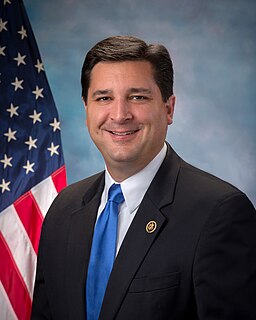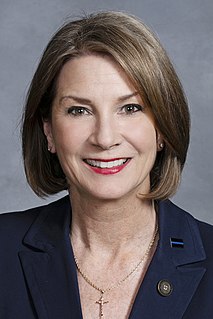
The North Carolina General Assembly is the bicameral legislature of the State government of North Carolina. The legislature consists of two chambers: the Senate and the House of Representatives. The General Assembly meets in the North Carolina Legislative Building in Raleigh, North Carolina, United States.

The North Carolina General Assembly of 2003–04 was the 145th session of the North Carolina General General Assembly. The assembly is a bicameral body including a House of Representatives and Senate. They both met in Raleigh, North Carolina in 2003 and 2004. Members of this North Carolina General Assembly were elected on November 5, 2002. The 2002 legislative elections were conducted under an interim redistricting map following the 2000 census; a more permanent redistricting map was passed in November 2003 for use through 2010.
Richard Timothy Morgan was a Republican member of the North Carolina General Assembly representing the state's fifty-second House district, including constituents in Moore County, for eight terms.

Roy Asberry Cooper III is an American attorney and politician serving as the 75th and current Governor of North Carolina since 2017. A member of the Democratic Party, he previously served as the 49th Attorney General of North Carolina from 2001 to 2016. Prior to that, he served in the North Carolina General Assembly in both the House of Representatives (1987–1991) and Senate (1991–2001).

The Illinois General Assembly is the bicameral legislature of the U.S. state of Illinois and comprises the Illinois House of Representatives and the Illinois Senate. The General Assembly was created by the first state constitution adopted in 1818. The State Senate has 59 members while the House has 118 members, each elected from single-member districts. A Senate district is formed by combining two adjacent House districts. The current General Assembly is Illinois's 102nd. The General Assembly meets in the Illinois State Capitol in Springfield, Illinois. Its session laws are generally adopted by majority vote in both houses, and upon gaining the assent of the Governor of Illinois. They are published in the official Laws of Illinois.

The South Carolina Senate is the upper house of the South Carolina General Assembly, the lower house being the South Carolina House of Representatives. It consists of 46 senators elected from single member districts for four-year terms at the same time as United States presidential elections.

North Carolina is currently divided into 13 congressional districts, each represented by a member of the United States House of Representatives. After the 2000 Census, the number of North Carolina's seats was increased from 12 to 13 due to the state's increase in population.

The Indiana House of Representatives is the lower house of the Indiana General Assembly, the state legislature of the U.S. state of Indiana. The House is composed of 100 members representing an equal number of constituent districts. House members serve two-year terms without term limits. According to the 2010 U.S. Census, each State House district contains an average of 64,838 people.

The Wisconsin Legislature is the state legislature of the U.S. state of Wisconsin. The Legislature is a bicameral body composed of the upper house Wisconsin State Senate and the lower Wisconsin State Assembly, both of which have had Republican majorities since January 2011. With both houses combined, the legislature has 132 members representing an equal number of constituent districts. The Legislature convenes at the state capitol in Madison.

The North Carolina Democratic Party (NCDP) is the North Carolina affiliate of the Democratic Party. It is headquartered in the historic Goodwin House, located in Raleigh.

The 1791 United States Senate election in New York was held on January 19, 1791 by the New York State Legislature to elect a U.S. Senator to represent the State of New York in the United States Senate. The election was conducted by a system of approval voting.

The North Carolina General Assembly 2011–2012 was the state legislature that first convened on January 26, 2011 and concluded in December 2012. Members of the North Carolina Senate and the North Carolina House of Representatives were elected on November 2, 2010. This 149th North Carolina General Assembly was the first North Carolina General Assembly with a Republican majority in both chambers since 1870.

David Cheston Rouzer is an American politician who is currently the U.S. Representative for North Carolina's 7th congressional district. Previously he was a Republican member of the North Carolina General Assembly representing constituents in Johnston County and Wayne County in the 12th district of the North Carolina Senate.

The 1800 United States presidential election in Pennsylvania took place on December 1, 1800 during a special session of the Pennsylvania General Assembly. Members of the bicameral state legislature chose 15 electors to represent Pennsylvania in the Electoral College as part of the 1800 United States presidential election. Eight Democratic-Republican electors and seven Federalist electors were selected. Unlike in the previous election, when one elector split his ballot between Republican Thomas Jefferson and Federalist Thomas Pinckney, all 15 electors followed the party line, with the Republicans voting for Jefferson and the Federalists for incumbent President John Adams. This was the first and only U.S. presidential election in which Pennsylvania's electors were not chosen by popular vote.

The North Carolina General Assembly 2013–2014 session is the state legislature that first convened on January 9, 2013 and concluded on August 20, 2014. Members of the North Carolina Senate and the North Carolina House of Representatives were elected on November 6, 2012, when the Republican Party increased the size of its majorities in both the North Carolina Senate and House of Representative to exceed the three-fifths number of elected members required for a super-majority.

Kathy Harrington is an American politician who has served in the North Carolina Senate from the 43rd district since 2011. She was elected Senate Majority Leader by her Republican colleagues following the 2020 elections - making her the first woman elected to that position.

Redistricting in North Carolina has been a controversial topic due to allegations and admissions of gerrymandering.

The North Carolina General Assembly of 2015–2016 was the state legislature that was first convened in Raleigh, North Carolina on January 14, 2015 and concluded in December 2016. This was the 151st meeting of the North Carolina General Assembly. Members of the North Carolina Senate and the North Carolina House of Representatives were elected on November 4, 2014. Republicans controlled the Senate and Democrats controlled the House of Representatives.

The North Carolina General Assembly 2017–2018 was the 152nd State legislature that first convened on January 11, 2017. Members of the North Carolina Senate and the North Carolina House of Representatives were elected on November 7, 2016. This legislature was in session from January 11, 2017 through June 30, 2017. Additional sessions were held on August 3, August 18 to 25, August 28 to 31, and October 4 to 17 in 2017. The 2018 session was held from January 10, 2018 through July 4, 2018.

Destin C. Hall is an American attorney and politician who is currently serving in the North Carolina House of Representatives, representing the 87th District.















